最新八年级英语(仁爱版)上册语法点归纳
英语仁爱版八年级上册笔记

英语仁爱版八年级上册笔记一、重点词汇1. almost /ˈɔːlməʊst/ adv. 几乎,差不多-例句:It's almost time to go. 差不多该走了。
2. few /fjuː/ adj. 很少的;几乎没有的pron. 很少- a few 一些;几个-例句:I have few friends here. 我在这里几乎没有朋友。
3. health /helθ/ n. 健康;卫生- healthy /ˈhelθi/ adj. 健康的-例句:Eating fruits is good for your health. 吃水果对你的健康有好处。
4. difference /ˈdɪfrəns/ n. 不同;差异;区别- different /ˈdɪfrənt/ adj. 不同的-例句:There are many differences between the two pictures. 这两张图片有很多不同之处。
5. important /ɪmˈpɔːtnt/ adj. 重要的- importance /ɪmˈpɔːtns/ n. 重要性-例句:It's important to learn English well. 学好英语很重要。
二、重点短语1. look after 照顾;照料-例句:You should look after your younger sister. 你应该照顾你的妹妹。
2. keep healthy 保持健康-例句:We should eat more fruits and vegetables to keep healthy. 我们应该多吃水果和蔬菜来保持健康。
3. be different from 与……不同-例句:My bike is different from yours. 我的自行车和你的不同。
4. a few days later 几天后-例句:He came back a few days later. 几天后他回来了。
最新八年级英语(仁爱版)上册语法点归纳
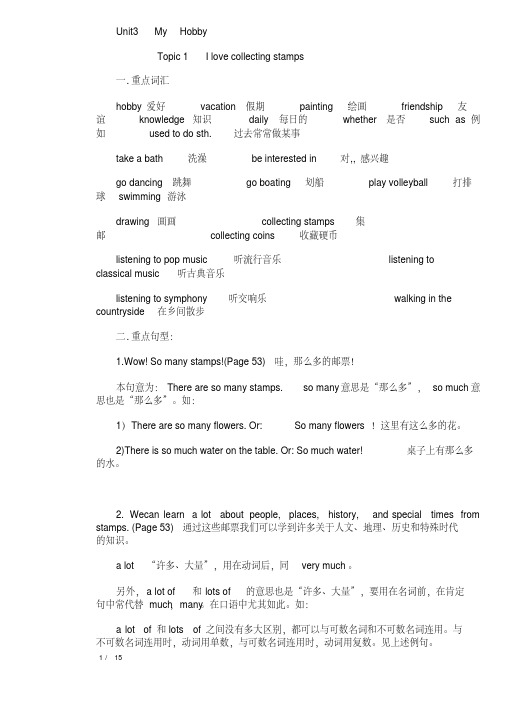
Unit3 My HobbyTopic 1 I love collecting stamps一.重点词汇hobby 爱好 vacation假期 painting 绘画 friendship友谊 knowledge 知识daily 每日的 whether 是否 such as 例如 used to do sth. 过去常常做某事take a bath 洗澡 be interested in 对,,感兴趣go dancing 跳舞 go boating 划船 play volleyball 打排球 swimming 游泳drawing 画画 collecting stamps 集邮 collecting coins 收藏硬币listening to pop music 听流行音乐 listening toclassical music 听古典音乐listening to symphony 听交响乐 walking in the countryside 在乡间散步二.重点句型:1.Wow! So many stamps!(Page 53)哇,那么多的邮票!本句意为:There are so many stamps. so many意思是“那么多”,so much意思也是“那么多”。
如:1)There are so many flowers. Or: So many flowers!这里有这么多的花。
2)There is so much water on the table. Or: So much water!桌子上有那么多的水。
2. We c an learn a lot about people, places, history, and special times from stamps. (Page 53)通过这些邮票我们可以学到许多关于人文、地理、历史和特殊时代的知识。
a lot “许多、大量”,用在动词后,同very much。
仁爱版八年级上册英语知识点总结(最新最全)

八年级上英语语法1)IeaVe的用法1.“leave+地点”表示“离开某地”。
例如:When did you IeaVe Shanghai?你什么时候离开上海的?2.“leave for+地点”表示“动身去某地”。
例如:NeXt Friday, AIiCe is IeaVing for London. 下周五,爱丽斯要去伦敦了。
3.“leave+地点+for+地点”表示“离开某地去某地"。
例如:Why are you IeaVing Shanghai for Beijing?你为什么要离开上海去北京?2)情态动词ShOUld “应该”学会使用ShOUld作为情态动词用,常常表示意外、惊奇、不能理解等,有“竟会”的意思,例如: HOw ShOUld I know?我怎么知道?Why ShOUId you be SO Iate today?你今天为什么来得这么晚?ShOUld有时表示应当做或发生的事,例如:We ShOUId help each other.我们应当互相帮助。
我们在使用时要注意以下几点:1.用于表示"应该”或“不应该”的概念。
此时常指长辈教导或责备晚辈。
例如:YOU ShOUld be here With CIean hands.你应该把手洗干净了再来。
2.用于提出意见劝导别人。
例如:YOU ShOUICI go to the doctor if you feel ill.如果你感觉不舒服,你最好去看医生。
3.用于表示可能性。
S hoUICl的这一用法是考试中常常出现的考点之一。
例如:We ShOUld arrive by SUPPer time.我们在晚饭前就能到了。
She ShOUId be here any moment.她随时都可能来。
31.What与WhiCh都是疑问代词,都可以指人或事物,但是What仅用来询问职业。
如:Whatis your father? 你父亲是干什么的?该句相当于:What does your father do?What is your father'S job?WhiCh指代的是特定范围内的某一个人。
最新仁爱版英语八年级上册语法汇总
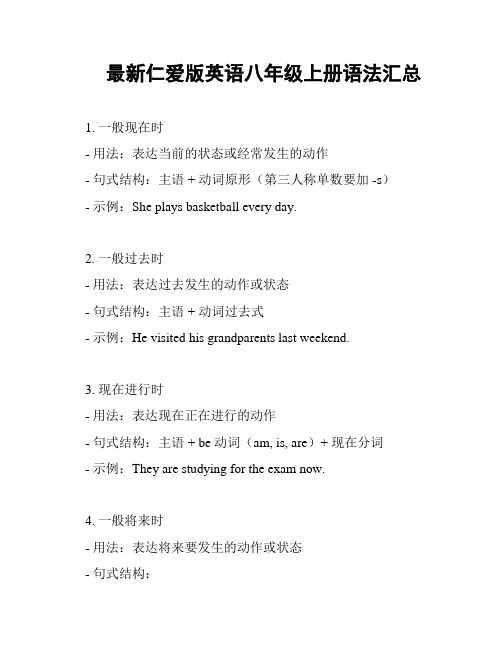
最新仁爱版英语八年级上册语法汇总
1. 一般现在时
- 用法:表达当前的状态或经常发生的动作
- 句式结构:主语 + 动词原形(第三人称单数要加 -s)
- 示例:She plays basketball every day.
2. 一般过去时
- 用法:表达过去发生的动作或状态
- 句式结构:主语 + 动词过去式
- 示例:He visited his grandparents last weekend.
3. 现在进行时
- 用法:表达现在正在进行的动作
- 句式结构:主语 + be 动词(am, is, are)+ 现在分词
- 示例:They are studying for the exam now.
4. 一般将来时
- 用法:表达将来要发生的动作或状态
- 句式结构:
- 主语 + will + 动词原形(肯定句)
- 主语 + won't + 动词原形(否定句)
- Will + 主语 + 动词原形?(疑问句)
- 示例:I will finish my homework later.
5. 现在完成时
- 用法:表达过去发生的但与现在相关的动作或状态
- 句式结构:主语 + have/has + 过去分词
- 示例:She has already eaten lunch.
以上是最新仁爱版英语八年级上册的语法汇总。
语法知识的掌握对于学习英语非常重要,希望以上内容能帮助你更好地理解和应用语法规则。
如果有任何疑问,请随时向我提问。
(完整版)仁爱版英语八年级上知识点归纳
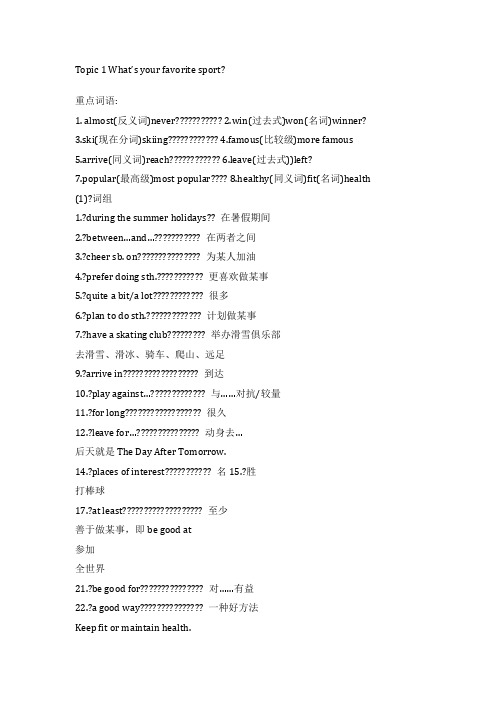
Topic 1 What’s your favorite sport?重点词语:1. almost(反义词)never2.win(过去式)won(名词)winner?3.ski(现在分词)skiing4.famous(比较级)more famous5.arrive(同义词)reach6.leave(过去式))left?7.popular(最高级)most popular 8.healthy(同义词)fit(名词)health (1)?词组1.?during the summer holidays?? 在暑假期间2.?between…and… 在两者之间3.?cheer sb. on 为某人加油4.?prefer doing sth. 更喜欢做某事5.?quite a bit/a lot 很多6.?plan to do sth. 计划做某事7.?have a skating club 举办滑雪俱乐部去滑雪、滑冰、骑车、爬山、远足9.?arrive in 到达10.?play against… 与……对抗/较量11.?for long 很久12.?leave for… 动身去…后天就是The Day After Tomorrow.14.?places of interest 名15.?胜打棒球17.?at least 至少善于做某事,即be good at参加全世界21.?be good for 对……有益22.?a good way 一种好方法Keep fit or maintain health.24.?relax oneself 放松某人自己重点句型你最喜爱的运动是什么?26.?Which sport do you prefer? = Which sport do you like better? 你更喜欢什么运动?I prefer skating. = I like skating better. 我更喜欢滑雪.你常滑雪吗?或Do you often skate?28.?She spends at least half an hour in the gym every day. 每天她至少花半小时在体育馆.29.?She plays baseball pretty well and she is also good at jumping.她棒球打得相当好而且擅长于跳.30.?What kind of sports do you like? = Which sport do you like? 你喜欢哪种运动? 重点语言点31.?see sb. do sth? “看见某人做了某事” 强调动作的全过程,常与every day; often 等连用.see sb. doing sth.? “看见某人正在做某事” 强调动作正在进行.I saw you play basketball almost every day during summer holidays.I often see him draw pictures near the river. 我常看见她在河边画画.I saw her go across the street.? 我看见她过了马路我看见她正在过马路。
英语八年级上册语法知识点仁爱版

英语八年级上册语法知识点仁爱版一、一般现在时1. 概念:表示经常发生的动作或存在的状态。
2. 构成:动词原形或第三人称单数形式。
3. 用法:表示经常性、习惯性的动作或存在的状态,也表示现在的特征或状态。
如:He often helps his mother do the housework. 他经常帮他妈妈做家务。
4. 特殊用法:表示主语具备的性格和能力,也可以表示客观事实或普遍真理。
如:She can sing this song in English. 她能用英语唱这首歌。
二、现在进行时1. 概念:表示正在进行的动作或存在的状态。
2. 构成:be动词(am/is/are)+动词的现在分词形式(-ing)。
3. 用法:表示正在进行的动作或存在的状态,强调的是正在发生的事情。
如:They are studying in the classroom. 他们在教室里学习。
4. 特殊用法:表示将来发生的动作,也可以表示过去发生的动作。
如:He is coming to see you tomorrow. 他明天要来看你。
(表示将来) They were having a meeting at this time yesterday. 昨天这个时候他们在开会。
(表示过去)三、现在完成时1. 概念:表示已经完成的动作或存在的状态,对现在产生的影响或结果。
2. 构成:have/has + 过去分词。
3. 用法:表示过去发生的动作已经完成,对现在产生的影响或结果。
如:I have finished my homework. 我已经完成了我的作业。
4. 特殊用法:可以表示发生在过去的动作延续到现在,也可以表示过去发生的动作与现在的状态有关。
如:He has lived here since 2000. 他从2000年就住在这里了。
(表示过去的动作延续到现在)They have been married for five years. 他们结婚已经五年了。
最新仁爱版八年级英语上册语法集锦大全
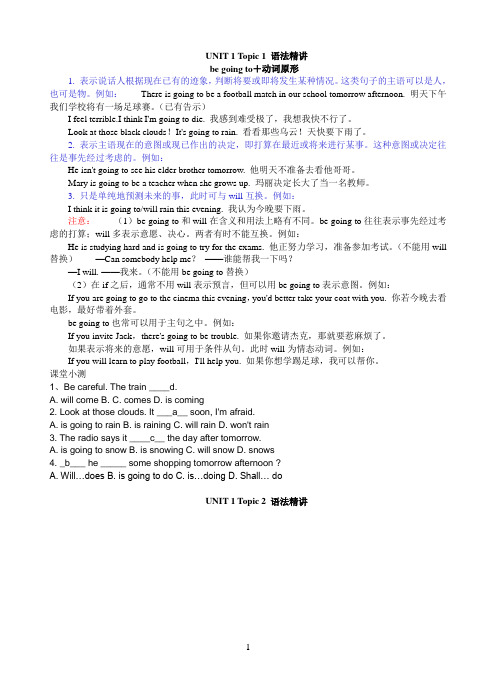
UNIT 1 Topic 1 语法精讲be going to+动词原形1. 表示说话人根据现在已有的迹象,判断将要或即将发生某种情况。
这类句子的主语可以是人,也可是物。
例如:There is going to be a football match in our school tomorrow afternoon. 明天下午我们学校将有一场足球赛。
(已有告示)I feel terrible.I think I'm going to die. 我感到难受极了,我想我快不行了。
Look at those black clouds!It's going to rain. 看看那些乌云!天快要下雨了。
2. 表示主语现在的意图或现已作出的决定,即打算在最近或将来进行某事。
这种意图或决定往往是事先经过考虑的。
例如:He isn't going to see his elder brother tomorrow. 他明天不准备去看他哥哥。
Mary is going to be a teacher when she grows up. 玛丽决定长大了当一名教师。
3. 只是单纯地预测未来的事,此时可与will互换。
例如:I think it is going to/will rain this evening. 我认为今晚要下雨。
注意:(1)be going to和will在含义和用法上略有不同。
be going to往往表示事先经过考虑的打算;will多表示意愿、决心。
两者有时不能互换。
例如:He is studying hard and is going to try for the exams. 他正努力学习,准备参加考试。
(不能用will 替换)—Can somebody help me?——谁能帮我一下吗?—I will. ——我来。
(不能用be going to替换)(2)在if之后,通常不用will表示预言,但可以用be going to表示意图。
八年级仁爱英语上册知识点
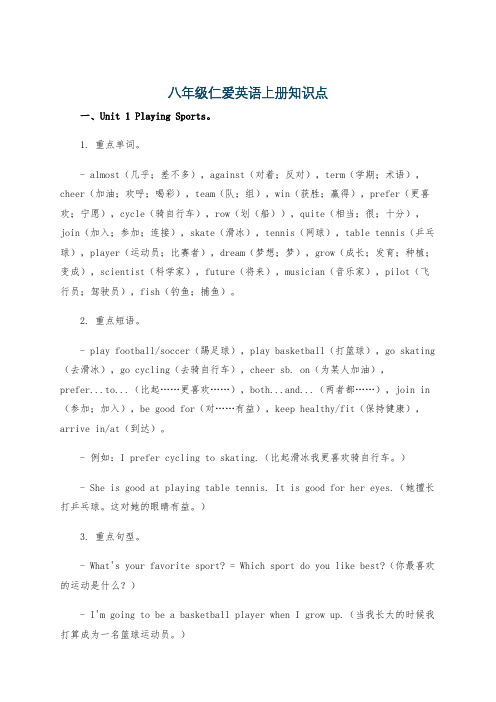
八年级仁爱英语上册知识点一、Unit 1 Playing Sports。
1. 重点单词。
- almost(几乎;差不多),against(对着;反对),term(学期;术语),cheer(加油;欢呼;喝彩),team(队;组),win(获胜;赢得),prefer(更喜欢;宁愿),cycle(骑自行车),row(划(船)),quite(相当;很;十分),join(加入;参加;连接),skate(滑冰),tennis(网球),table tennis(乒乓球),player(运动员;比赛者),dream(梦想;梦),grow(成长;发育;种植;变成),scientist(科学家),future(将来),musician(音乐家),pilot(飞行员;驾驶员),fish(钓鱼;捕鱼)。
2. 重点短语。
- play football/soccer(踢足球),play basketball(打篮球),go skating (去滑冰),go cycling(去骑自行车),cheer sb. on(为某人加油),prefer...to...(比起……更喜欢……),both...and...(两者都……),join in (参加;加入),be good for(对……有益),keep healthy/fit(保持健康),arrive in/at(到达)。
- 例如:I prefer cycling to skating.(比起滑冰我更喜欢骑自行车。
)- She is good at playing table tennis. It is good for her eyes.(她擅长打乒乓球。
这对她的眼睛有益。
)3. 重点句型。
- What's your favorite sport? = Which sport do you like best?(你最喜欢的运动是什么?)- I'm going to be a basketball player when I grow up.(当我长大的时候我打算成为一名篮球运动员。
仁爱八年级英语上册

仁爱八年级英语上册一、重点语法。
1. 一般将来时。
- 结构:will+动词原形(表示将来某个时间要发生的动作或存在的状态)- 例如:I will go to Beijing next week.- be going to+动词原形(表示打算、计划做某事或根据某种迹象表明即将发生某事)- 例如:It is going to rain. Look at the dark clouds.2. 形容词的比较级和最高级。
- 比较级的构成:- 一般在形容词词尾加 -er,如:tall - taller。
- 以不发音的e结尾的形容词,加 -r,如:nice - nicer。
- 以重读闭音节结尾且末尾只有一个辅音字母的形容词,双写这个辅音字母再加-er,如:big - bigger。
- 多音节形容词和部分双音节形容词,在前面加more,如:beautiful - more beautiful。
- 比较级的用法:- 用于两者之间的比较,常用结构:A+be+比较级+than + B。
例如:Tom is taller than Jack.- 最高级的构成:- 一般在形容词词尾加 -est,如:tall - tallest。
- 以不发音的e结尾的形容词,加 -st,如:nice - nicest。
- 以重读闭音节结尾且末尾只有一个辅音字母的形容词,双写这个辅音字母再加-est,如:big - biggest。
- 多音节形容词和部分双音节形容词,在前面加most,如:beautiful - most beautiful。
- 最高级的用法:- 用于三者或三者以上的比较,常用结构:A+be+the+最高级+in/of+范围。
例如:Mount Everest is the highest mountain in the world.3. 宾语从句。
- 宾语从句的语序为陈述句语序。
- 连接词:- 当从句为陈述句时,连接词用that(可省略)。
仁爱英语八年级上册笔记

仁爱英语八年级上册笔记一、Unit 1 Playing Sports。
(一)重点单词。
1. almost.- 词性:副词,意为“几乎,差不多”。
例如:I almost missed the bus this morning.(今天早上我差点错过公交车。
)2. against.- 词性:介词,有“对着;反对”的意思。
例如:We will play against Class 2 tomorrow.(我们明天将和二班比赛。
)3. team.- 词性:名词,“队,组”。
例如:Our school football team is very strong.(我们学校的足球队非常强大。
)4. win.- 词性:动词,“获胜,赢得”,过去式为won,过去分词为won。
例如:We won the game last week.(我们上周赢得了比赛。
)- 区别于beat:win后面接比赛、奖品等;beat后面接对手。
例如:We won the match. We beat them.(我们赢得了比赛。
我们打败了他们。
)5. cheer.- 词性:动词,“欢呼,喝彩;为……加油”。
例如:The students cheeredfor their team loudly.(学生们大声地为他们的队伍加油。
)- 相关短语:cheer up(使振奋,使高兴起来)。
例如:Let's cheer him up.(让我们使他振作起来。
)(二)重点短语。
1. play football/basketball/volleyball.- 玩足球/篮球/排球。
例如:He likes to play football after school.(他放学后喜欢踢足球。
)2. go skating/swimming.- 去滑冰/游泳。
例如:They often go skating in winter.(他们冬天经常去滑冰。
)3. join in.- 参加(活动)。
仁爱版八年级英语上册

仁爱版八年级英语上册一、重点词汇解析1. almost /ˈɔːlməʊst/:几乎,差不多。
-例句:It's almost time to go.(差不多该走了。
)-辨析:nearly 和almost 意思相近,但在具体用法上略有不同。
almost 可与no,none,nothing,never 等否定词连用,而nearly 一般不与这些否定词连用。
2. beat /biːt/:(在比赛或竞争中)赢,打败。
-例句:Our team beat theirs in the football match.(在足球比赛中我们队打败了他们队。
)-辨析:win 和beat 都有“赢”的意思,但用法不同。
win 后接比赛、奖品、战争等名词;beat 后接人或团队。
3. exciting /ɪkˈsaɪtɪŋ/:令人兴奋的,使人激动的。
-例句:The football game was very exciting.(这场足球比赛非常令人兴奋。
)-辨析:exciting 修饰事物,表示“令人兴奋的”;excited 修饰人,表示“感到兴奋的”。
4. although /ɔːlˈðəʊ/:虽然,尽管。
-例句:Although he is young, he knows a lot.(虽然他很年轻,但他知道很多。
)-辨析:although 和though 意思相同,都可引导让步状语从句,但although 比though 更正式。
5. pleasant /ˈpleznt/:令人愉快的,舒适的。
-例句:We had a pleasant trip.(我们有一次愉快的旅行。
)-辨析:pleasant 和pleased 都有“愉快的”意思,但用法不同。
pleasant 修饰事物;pleased 修饰人,表示“感到愉快的”。
二、重点短语1. take part in:参加。
-例句:I took part in the sports meeting.(我参加了运动会。
仁爱英语八年级上册知识点归纳【四篇】
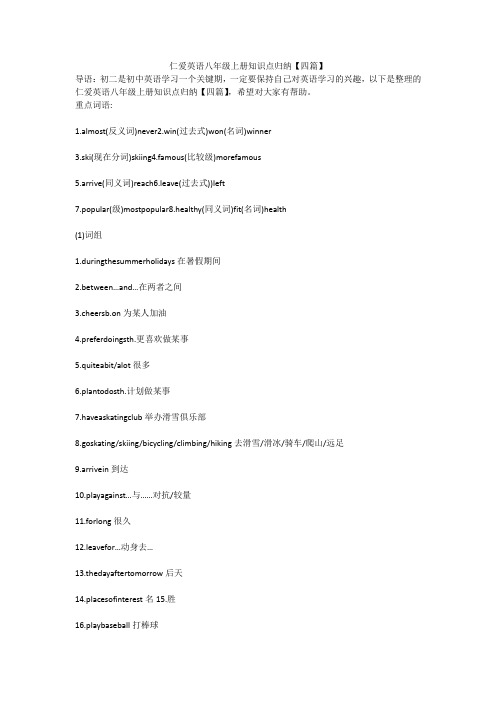
仁爱英语八年级上册知识点归纳【四篇】导语:初二是初中英语学习一个关键期,一定要保持自己对英语学习的兴趣,以下是整理的仁爱英语八年级上册知识点归纳【四篇】,希望对大家有帮助。
重点词语:1.almost(反义词)never2.win(过去式)won(名词)winner3.ski(现在分词)skiing4.famous(比较级)morefamous5.arrive(同义词)reach6.leave(过去式))left7.popular(级)mostpopular8.healthy(同义词)fit(名词)health(1)词组1.duringthesummerholidays在暑假期间2.between…and…在两者之间3.cheersb.on为某人加油4.preferdoingsth.更喜欢做某事5.quiteabit/alot很多6.plantodosth.计划做某事7.haveaskatingclub举办滑雪俱乐部8.goskating/skiing/bicycling/climbing/hiking去滑雪/滑冰/骑车/爬山/远足9.arrivein到达10.playagainst…与……对抗/较量11.forlong很久12.leavefor…动身去…13.thedayaftertomorrow后天14.placesofinterest名15.胜16.playbaseball打棒球17.atleast至少18.begoodat善于做某事19.takepartin参加20.allovertheworld全世界21.begoodfor对……有益22.agoodway一种好方法23.keepfit/healthy保持健康24.relaxoneself放松某人自己重点句型25.What’syourfavoritesport?=Whatsportdoyoulikebest?你最喜爱的运动是什么?26.Whichsportdoyouprefer?=Whichsportdoyoulikebetter?你更喜欢什么运动? Ipreferskating.=Ilikeskatingbetter.我更喜欢滑雪.27.Doyouskatemuch?=Doyouoftenskate?你常滑雪吗?28.Shespendsatleasthalfanhourinthegymeveryday.每天她至少花半小时在体育馆.29.Sheplaysbaseballprettywellandsheisalsogoodatjumping.她棒球打得相当好而且擅长于跳.30.Whatkindofsportsdoyoulike?=Whichsportdoyoulike?你喜欢哪种运动?重点语言点31.seesb.dosth“看见某人做了某事”强调动作的全过程,常与everyday;often等连用. seesb.doingsth.“看见某人正在做某事”强调动作正在进行.如:Isawyouplaybasketballalmosteverydayduringthesummerholidays. Ioftenseehimdrawpicturesneartheriver.我常看见她在河边画画.Isawhergoacrossthestreet.我看见她过了马路Isawhergoingacrossthestreet.我看见她正在过马路.[类似的有watch,hear,feel等这类感观动词.]32.joinsb.表示“加入某人的行列”“和某人在一起”join+组织表示“加入某个组织”takepartin表示“参加/出席某个活动”如:Willyoujoinus?Iwilljointheskiingclub. Sheisplanningtotakepartinthehighjump.33.arrivein+大地点arriveat+小地点getto+地点=reach+地点如:MyunclearrivedinBeijingyesterday.IarrivedattheGreatWall.=IgottotheGreatWall.=IreachedtheGreatWall.注意:reachhere/there/home=gethere/there/home=arrivehere/there/home 34.leave…离开……leavefor…动身去…/离开到…如:TheyareleavingBeijingtomorrow.明天他们要离开北京. TheyareleavingforJapanthedayaftertomorrow.后天他们要前往日本.35.afew“几个;一些”修饰可数名36.词alittle“一点点”修饰不数名词如:Thereareafeweggsinthebasket.Thereisalittlewaterinthebottle.37.howlong表示“多久(时间)”;提问时间段.howoften表示“多常;多久一次”;提问时间的频率.如:TheywillstayinBeijingforaweek.→HowlongwilltheystayinBeijing?Heplaysbasketballtwiceaweek.→Howoftendoesheplaybasketball?7.begoodat(doing)sth.=dowellin(doing)sth.擅长于(做)某事如:Sheisgoodat(playing)baseball.=Shedoeswellin(playing)baseball.8.makesth/sb+adj.使某物(某人)在某种状态keep…sth/sb+adj.保持某物(某人)在某种状态如:Playingsoccercanmakeyourbodystrong.Swimmingcanhelptokeepyourheartandlungshealthy.重点语法一般将来时:(一)begoingto结构:①表示主语进行某一将来行动的打算、意图。
仁爱版英语八年级上册八上必背动词短语汇总(含语法)

仁爱版英语八年级上册八上必背动词短语汇总(含语法)仁爱版英语八年级上册八上必背动词短语汇总(含语法)表达喜好和意愿- Would like to (do something):愿意(做某事)- Prefer (to do something):更喜欢(做某事)- Enjoy (doing something):喜欢(做某事)- Love (doing something):爱(做某事)- Hate (doing something):讨厌(做某事)- Want (to do something):想要(做某事)- Hope (to do something):希望(做某事)表达能力- Be able to (do something):能够(做某事)- Can (do something):能够(做某事)- Could (do something):可以(做某事)- Know how to (do something):知道如何(做某事)- Have the ability to (do something):有能力(做某事)表达喜欢和不喜欢的程度- Really enjoy (doing something):非常喜欢(做某事)- Absolutely love (doing something):非常喜爱(做某事)- Quite like (doing something):相当喜欢(做某事)- Don't mind (doing something):不介意(做某事)- Dislike (doing something):不喜欢(做某事)- Really hate (doing something):非常讨厌(做某事)表达惯和经验- Used to (do something):过去常常(做某事)- Be used to (doing something):惯(做某事)- Get used to (doing something):逐渐惯(做某事)- Have experience in (doing something):有经验(做某事)- Be good at (doing something):擅长(做某事)表达意图和目的- Intend (to do something):打算(做某事)- Plan (to do something):计划(做某事)- Aim (to do something):打算(做某事)- Purpose (to do something):目的(做某事)表达允诺和建议- Promise (to do something):承诺(做某事)- Agree (to do something):同意(做某事)- Suggest (doing something):建议(做某事)- Advise (doing something):劝告(做某事)表达兴趣和态度- Be interested in (doing something):对(做某事)感兴趣- Be excited about (doing something):对(做某事)感到兴奋- Be worried about (doing something):对(做某事)感到担忧- Be surprised at (doing something):对(做某事)感到惊讶表达情感和感受- Feel like (doing something):有想要(做某事)的感觉- Look forward to (doing something):期待(做某事)- Be happy about (doing something):为(做某事)感到高兴- Be sad about (doing something):为(做某事)感到伤心以上是仁爱版英语八年级上册八上必背动词短语汇总的内容。
完整版)仁爱版八年级上册英语知识点汇总(完整版)

完整版)仁爱版八年级上册英语知识点汇总(完整版)Unit 1 Topic 1: English Phrases for 8th Grade1."Be going to do" means to plan to do something.2."See sb do sth" means to witness someone doing something (the entire process)。
"See sb doing sth" means to witness someone in the middle of doing something.3."XXX.4."Play against" means to XXX.5."Be against" means to oppose something。
"Be for" means to support something.6."Practice + doing" means to practice doing something.7."Prefer + doing" means to like something more than something else.8."Prefer + doing/n。
to doing/n." means to like doing something more than something else.9."Prefer to do" means to prefer doing something over something else.10."Quite a lot/bit" means often.11."Which" means what kind of。
(完整版)仁爱版八年级上册英语知识点汇总(完整版)

八年级上学期英语知识点八年级英语短语总汇Unit1 Topic11.be going to do 打算做某事2.See sb do sth看见某人做某事(全过程)See sb doing sth看见某人正在做某事(正在进行)3.cheer sb on为...加油4.Play against=fight against 与...对抗/大战5.Be against--Be for 反对—赞同6.practice+doing 练习做...7.Prefer+doing 跟喜欢...Prefer doing to doing 或比起做后者,更喜欢做前者Perfer to do, quite a lot/bit/often.Which one do you prefer, which kind of that?10. Join+某人/组织Join in+活动/比赛加入Take part in+活动/比赛Be in+活动/比赛13.Know about... 知道/了解有关于...当时间来临时,我们将采取行动;这是我们的计划。
15. It takes sb+时间/钱 to do sthSpend+时间/钱+(in) doing sth 在某方面花费多少Spend+时间/钱+on+n.物+cost+时间/钱16.There be going to be=there will be 这里将会有...17.Be good at+(doing)sth=Do well in+(doing)sth 擅长做...18.Be sure that+宾语从句确信... 19.Be sure to do 肯定要做...20.Be sure of/about 对...有把握 21.At the weekend 在周末22.Make sb/sth+adj 使...处在什么状态23.Keep+adj 保持...;keep sb/sth+adj 使...保持什么状态24.A way to 一种...的方法 25.Relax oneself 使某人自己放松26.Play for 为...效力27.Arrive in=get to=reach+大地方;Arrive at+小地方28.Excited(人);exciting(物)29.Leave for动身做某地;leave A for B 离开A地去B地Unit1 Topic21.Could you(not)....=cuold/would you please(not)do=would/do youmind(not)doing=Would you mind (not)+if+从句2.fall ill=be ill 生病其中之一是n的复数形式.优化后的文本可以是:Use 'keep doing' for continuous action and 'keep on doing' for repeated action with intervals.5.Help sb.=give sb a hand 帮助某人6.V.+间宾(人)+直宾(物)=V.+直宾+to/for+间宾7.Sure=certainly=of course 当然8.Not at all=certainly not=of course not 不介意9.Never mind=it’s nothing=it’s doesn’t matter 没关系乱扔11.Adj.修饰不定代词放其后12.Be sorry for/about.... 对...感到内疚13.What do you mean by...?=what does...mean?=what’s the meaning of...?意思是什么?14.Shout at sb. 斥责某人15.Do/try one’s best to do sth 尽某人做大的努力做某事16.Be angry with sb. For doing sth 因为某人做某事而生气17.be angry at/about sth 因某事而生气18.be angry with 因...而生气19.With the help of sb.=with one’help 在某人的帮助下20.Say...to sb. 对某人说...e into being=be born 形成/产生22.So...that... 如此...以致...=to...too... 太...而不能...23.A century=one hundred year 一个世纪24.Over=more than 超过25.Through(中间)=aross(表面) 通过阻止他们从做28.It’s + adj +(for sb.)+to do (对某人来说)做...是...29.Another+基数词又一,在一; other +n.复数另外的Around=all_over 处到处31.Just for...只是为了...32.Turn...into... 使...变成...33.Sit around 围坐在34.Get from doing 得到...35.Such as 后不可列出前面所提过的所有东西36.A number of+n.可数复数许多的;the number of+n.单数 ...的数量37.Hero 复数(Pl.) heroesUnit1 Topic31.连字符后不加soman则例外,需用复数。
仁爱版八年级上册英语知识点汇总完整版
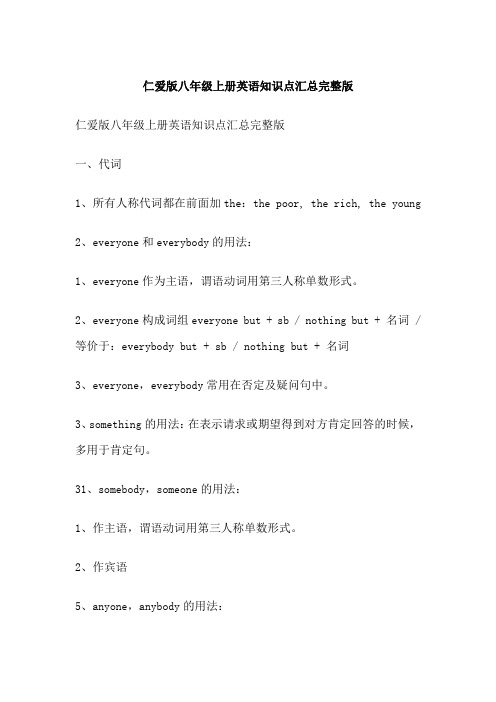
仁爱版八年级上册英语知识点汇总完整版仁爱版八年级上册英语知识点汇总完整版一、代词1、所有人称代词都在前面加the:the poor, the rich, the young2、everyone和everybody的用法:1、everyone作为主语,谓语动词用第三人称单数形式。
2、everyone构成词组everyone but + sb / nothing but + 名词 / 等价于:everybody but + sb / nothing but + 名词3、everyone,everybody常用在否定及疑问句中。
3、something的用法:在表示请求或期望得到对方肯定回答的时候,多用于肯定句。
31、somebody,someone的用法:1、作主语,谓语动词用第三人称单数形式。
2、作宾语5、anyone,anybody的用法:1、用作主语,谓语动词用第三人称单数形式2、用作宾语3、用在否定及疑问句中6、none的用法:1、none作主语,可指人,也可以指物。
谓语动词既可以用单数,也可以用复数形式。
2、none作宾语3、none用于否定及疑问句中7、every one的用法:every one = everyone 表示客观事实,即大家公认的事实置于所修饰词之后。
如: She cleaned every surface in the room, She cleaned every one of the windows.二、副词及其比较级1、very修饰形容词,副词原型 (not very difficult不难)2、quite修饰形容词,副词原型 (not quite good,不够好)3、too修饰形容词,副词原型 (The book is too difficult/ long for you to read这本书对你来说太难/太长而难以阅读)4、“很,非常”除了修饰形容词原级外,还可以修饰比较级和副词原形(如:very much,much)5、almost和nearly一样都表示“几乎”如:nearly ten o’clock / almost ten o’clock6、as…as之间用形容词或副词的原级,“和……一样”,不能用比较级。
- 1、下载文档前请自行甄别文档内容的完整性,平台不提供额外的编辑、内容补充、找答案等附加服务。
- 2、"仅部分预览"的文档,不可在线预览部分如存在完整性等问题,可反馈申请退款(可完整预览的文档不适用该条件!)。
- 3、如文档侵犯您的权益,请联系客服反馈,我们会尽快为您处理(人工客服工作时间:9:00-18:30)。
Unit3 My HobbyTopic 1 I love collecting stamps一.重点词汇hobby 爱好 vacation假期 painting 绘画 friendship友谊 knowledge 知识daily 每日的 whether 是否 such as 例如 used to do sth. 过去常常做某事take a bath 洗澡 be interested in 对,,感兴趣go dancing 跳舞 go boating 划船 play volleyball 打排球 swimming 游泳drawing 画画 collecting stamps 集邮 collecting coins 收藏硬币listening to pop music 听流行音乐 listening toclassical music 听古典音乐listening to symphony 听交响乐 walking in the countryside 在乡间散步二.重点句型:1.Wow! So many stamps!(Page 53)哇,那么多的邮票!本句意为:There are so many stamps. so many意思是“那么多”,so much意思也是“那么多”。
如:1)There are so many flowers. Or: So many flowers!这里有这么多的花。
2)There is so much water on the table. Or: So much water!桌子上有那么多的水。
2. We c an learn a lot about people, places, history, and special times from stamps. (Page 53)通过这些邮票我们可以学到许多关于人文、地理、历史和特殊时代的知识。
a lot “许多、大量”,用在动词后,同very much。
另外,a lot of 和lots of 的意思也是“许多、大量”,要用在名词前,在肯定句中常代替much,many。
在口语中尤其如此。
如:a lot of和lots of之间没有多大区别,都可以与可数名词和不可数名词连用。
与不可数名词连用时,动词用单数,与可数名词连用时,动词用复数。
见上述例句。
4. What things do you love collecting? (Page 53)你喜欢集什么东西?love + doing表示“喜欢、爱好”,也可以用like+ doing表示。
如:5.I am interested in playing sports. (Page 54)我对运动感兴趣。
be interested in (doing) sth. “对,,感兴趣”6.What do you often do in your spare time? (Page 55)在你的业余时间里面你都做些什么啊?in one’s spare time “在业余时间”“在闲暇之际”,也可用in one’s free time 替换。
如:7. I often go fishing. (Page 55)我经常去钓鱼。
go + doing表示“去做某事”go +v-ing结构很常用,多用于体育活动和业余娱乐活动。
如:1)Let’s go fishing next Sunday.下星期天我们去钓鱼吧。
2)Are you going hiking this weekend?这个周末你打算去远足吗?另外还有:go hunting 去打猎go shooting 去射击go swimming 去游泳go bathing 去沐浴go shopping 去购物go climbing 去爬山8.And I do a lot of reading. (Page 55)我通常都是阅读一些书籍。
在英语中有不少由“do + doing”的结构,表示“干某事”。
如:散步do some walking do a lot of walking读书do some readingdo a lot of reading洗衣服do some washingdo a lot of washing买东西do some shoppingdo a lot of shopping清扫do some cleaningdo a lot of cleaning11.Why not go out and do some outdoor activities? (Page 55)为什么不走出去做一些户外运动呢?这是一个省略句,全句可以说成Why shall we not go out and do some outdoor activities?常在口语中使用,用来征求对方的意见或表达建议。
使用这种句子必须要有上下文,如:13.My interests are changing all the time. (Page 56) 我的兴趣爱好总是在不断地改变。
all the time“总是、一直”。
14. And I wasn’t interested in sports at all. (Page 56)我对运动一点兴趣都没有。
not...at all “一点也不,,”;“全然不”。
如:1)I didn’t mind it at all. 我一点也不在意。
2)—Thank you for helping me.谢谢你帮助我。
—Not at all.没关系。
3)He didn’t know that at all. 他对此事一无所知。
15. But now, my hobbies are sports, like soccer and swimming. (Page 56)但是现在我的爱好是体育,比如足球和游泳。
like “像,,,好比,,”。
如:1)He swims very quickly like a fish.他游泳非常地快,像一条鱼。
2) The cake is round like a moon.这块蛋糕是圆的,就像月亮一样。
18. I enjoy listening to rock music. (Page 56)我喜欢听摇滚音乐。
like, love, enjoy和prefer,这四个词都有“喜欢”之意,但用法不同。
试比较:like意为“喜欢、爱好”,语气较弱,其后可跟名词、代词、不定式、动名词等作宾语。
like也常跟复合宾语,宾语补足语常用动词不定式。
love意为“爱,热爱,喜欢”,常指对祖国、亲人及朋友的爱,也可用于事物,强调非常喜欢,具有较强的感情色彩。
其后可跟名词、动名词、代词或不定式作宾语。
如:1)Father loves his work.爸爸热爱他的工作。
2)I love watching TV.我爱看电视。
3)Children love to play this game.孩子们爱做这种游戏。
4)We all love our great motherland.我们热爱我们伟大的祖国。
enjoy意为“喜欢,欣赏”,含有“乐于、享受,,之乐趣”之意,其后可以跟名词、代词或动名词作宾语。
enjoy oneself表示“玩得愉快”之意。
prefer意为“宁愿、更喜欢”,常用于两者之间的选择,其后可跟名词、代词、动名词或不定式。
prefer...to...表示“宁愿,,,不愿,,”,“喜欢,,而不喜欢,,”,其中to为介词,后可跟名词或动名词。
如:1)Which do you prefer, tea or coffee?你比较喜欢喝茶,还是喝咖啡?2)I prefer walking to cycling.我喜欢步行胜过骑单车。
3)My brother likes maths, but I prefer English.我哥哥喜欢数学,而我更喜欢英语。
20.I used to do that in the pond in front of my house. ( Page 57)我过去常在我家门前的池塘里游泳。
in front of “在,,的前面”;指在物体外部的前面。
而in the front of “,,的前部”;指在物体内部的前面,即前部。
注意它们的区别。
试比较:1)There is a tall tree in front of my house.我家房前有一棵大树。
2)Don’t stand in front of me. I can’t see the blackboard.别站在我前面。
我都看不见黑板了。
21.Nobody. I taught myself. ( Page 57) 没有任何人,我自学的。
=learn by oneselfteach oneself “自学、自修”。
teach动词“教授、教,,”有些动词后常跟反身代词,如:enjoy oneself “过得愉快”, help oneself “随便吃(用),,”。
如:22.When they are free, people usually do what they like. (Page 58)当人们空闲的时候,他们总是做一些自己喜欢的事情。
free “有空、空闲”, be free可以替换为have time。
如:24.When people become old, hobbies can keep them healthy. When people are sick, hobbies can help them get well sooner.(Page 58)当人们变老的时候,爱好可以帮助他们保持健康。
当人们身体虚弱的时候,爱好还可以帮助他们很快地康复。
本句中become, keep, be, 与get都是系动词。
系动词的基本用法是其后加形容词做表语。
系动词一共可以分为两大类:表示状态的和表示状态变化的。
系动词表示状态的又分为以下三类:1)be, seem, appear等。
2)由感官动词变化而来的,翻译成中文通常可以翻译成“,,起来”,这些系动词有:look, sound, feel, taste, smell等。
3)由不及物动词转化而来的,这些系动词有:stand, keep, prove, remain系动词表示状态变化的包括:become, go, get, grow, turn, fall等。
如:三.语法学习1.I used to listen to rock music but now I collect telephone cards andpaintings. (Page 53)我过去常听摇滚乐,可现在我集电话卡和画。
